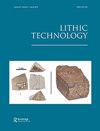The Paleolithic Quartz Assemblages of Denizli (South Aegean, Western Anatolia): A Selection of Bipolar Knapping, Techno-Typological and Experimental Approaches
IF 1.2
3区 社会学
Q2 ANTHROPOLOGY
引用次数: 0
Abstract
ABSTRACT After the discovery of Homo erectus remains (circa 1.2 Ma) in Denizli, through examination of their surviving material culture, many sites containing lithics which could be attributed to Homo erectus have been located. It have revealed quartz assemblages in the parts of Denizli connected to the Menderes and Gediz Massif. The assemblages detected in Buldan and Güney associate with Mode 1 and Mode 2 techno-complexes. As the first systematic bipolar knapping study in the Paleolithic of Turkey, techno-typological analyses supported by experimental analyses will be a guide for future studies. As a result of these analyses, bipolar knapping, freehand technique, and the alternate use of both could be suggested as strategies for dealing with environmental raw material limitations or as a technical behavioral choice. In this context, the lithic assemblages in question, with their specific characteristics, shed new light on the dispersal of the early hominins out of Africa.Denizli(南爱琴海,安纳托利亚西部)旧石器时代石英组合:双极Knapping、技术类型和实验方法的选择
摘要在德尼兹利发现约1.2 Ma的直立人遗骸后,通过对其现存物质文化的考察,发现了许多可能属于直立人的含锂遗址。它揭示了Denizli与Menderes和Gediz地块相连部分的石英组合。在布尔丹和格尼探测到的组合与模式1和模式2技术复合体有关。作为土耳其旧石器时代第一个系统的两极撞击研究,由实验分析支持的技术类型学分析将为未来的研究提供指导。作为这些分析的结果,双极敲击、徒手技术以及两者的交替使用可以被建议作为应对环境原材料限制的策略或作为一种技术行为选择。在这种背景下,所讨论的石器时代组合及其特定特征,为早期人类从非洲的传播提供了新的线索。
本文章由计算机程序翻译,如有差异,请以英文原文为准。
求助全文
约1分钟内获得全文
求助全文

 求助内容:
求助内容: 应助结果提醒方式:
应助结果提醒方式:


